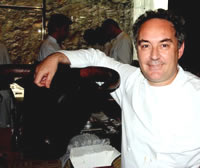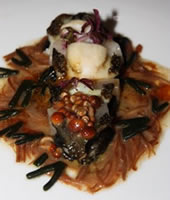The term “molecular cuisine” is often used in conjunction with Spanish cocina de vanguardia, but the world-renowned Spanish Chef Ferran Adrià objects to using this description to describe his style of cooking at El Bulli, writes Gerry Dawes.
 In an exclusive interview with Gerry, Ferran tried to dispel this common misconception. He said in the interview, ‘I would like to use this occasion to debunk the myth of molecular cuisine. I am aware that in many countries they say that at El Bulli we practice molecular cuisine. But the truth is there are few qualifiers that define with such preciseness the cooking that we practice, because molecular cuisine is not a style of cooking.’ In an exclusive interview with Gerry, Ferran tried to dispel this common misconception. He said in the interview, ‘I would like to use this occasion to debunk the myth of molecular cuisine. I am aware that in many countries they say that at El Bulli we practice molecular cuisine. But the truth is there are few qualifiers that define with such preciseness the cooking that we practice, because molecular cuisine is not a style of cooking.’
‘First off, the term comes from molecular gastronomy, which at the same time only describes the dialogue between cooks and scientists who are trying to understand the chemical and physical processes that are produced in the kitchen. But, as I have said many times, understanding what happens when a steak is cooking or how to make a mayonnaise does not bring anything into the evolution of the history of cooking in the stylistic sense.’
‘All knowledge is good for those who are cooking, but that is not the reason in itself that a new style is created. To draw a parallel, it is not necessary for a great architect to know how to make metal alloys to create a work that is important in architectural history. But, in any case, this knowledge, which I will readily admit is always positive, has nothing to do with what an architect brings to the style.’
 ‘What appears absurd to us is that the architecture of a creator who knows about metal alloy is called “molecular architecture.” The way the theme (molecular cuisine) is being presented, it appears that the kitchen is a place basically to carry out scientific experiments. And this is not the case. I would like to make clear that science for a chef has great value, although, I repeat, always so that he can understand the processes, to know more, to enrich our knowledge. In the same way it helps to understand the processes of other disciplines.’ ‘What appears absurd to us is that the architecture of a creator who knows about metal alloy is called “molecular architecture.” The way the theme (molecular cuisine) is being presented, it appears that the kitchen is a place basically to carry out scientific experiments. And this is not the case. I would like to make clear that science for a chef has great value, although, I repeat, always so that he can understand the processes, to know more, to enrich our knowledge. In the same way it helps to understand the processes of other disciplines.’
Because of this misconception about the use of science in the kitchen, Ferran says, the name ‘cocina molecular' is being used as the name to define the cocina de vanguardia that we do at El Bulli and, in general, many restaurants everywhere. Y with that they want to define a cuisine ‘based in science’ when in reality all that vanguard cuisine is trying to do is to try to open up new fields, understand more about everything, but only from a scientific standpoint. Our contacts have been established not only with scientists, but artists, industrial designers, nutrition experts, the food industry, etc. All this is done to procure the best knowledge, but all this is only tools at the service of the philosophy of style and of the way that each chef sees his cooking.’
Adrian is the famed head chef of the 3-Michelin starred El Bulli Restaurant in Roses on the Costa Brava in Spain. He is considered one of the best chefs in the world and tops the European Restaurant Ranking. Restaurant 50 has rated El Bulli as the Best Restaurant in 2007 and 2008. He is well known for creating culinary foam.
 Gerry Dawes was awarded Spain's prestigious Premio Nacional de Gastronomía (National Gastronomy Award) in 2003. He writes and speaks frequently on Spanish wine and gastronomy and leads gastronomy, wine and cultural tours to Spain. He was a finalist for the 2001 James Beard Foundation's Journalism Award for Best Magazine Writing on Wine. Mr. Dawes is currently working on a reality television series on wine, gastronomy, culture and travel in Spain. Experience Spain With Gerry Dawes: Culinary Trips to Spain & Travel Consulting on Spain He may be reached at gerrydawes@aol.com Alternate e-mail (use only if your e-mail to AOL is rejected): gerrydawes@hotmail.com Gerry Dawes was awarded Spain's prestigious Premio Nacional de Gastronomía (National Gastronomy Award) in 2003. He writes and speaks frequently on Spanish wine and gastronomy and leads gastronomy, wine and cultural tours to Spain. He was a finalist for the 2001 James Beard Foundation's Journalism Award for Best Magazine Writing on Wine. Mr. Dawes is currently working on a reality television series on wine, gastronomy, culture and travel in Spain. Experience Spain With Gerry Dawes: Culinary Trips to Spain & Travel Consulting on Spain He may be reached at gerrydawes@aol.com Alternate e-mail (use only if your e-mail to AOL is rejected): gerrydawes@hotmail.com
|